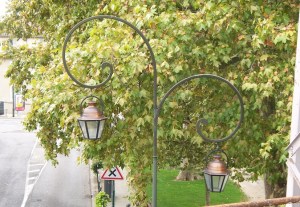
Now that we’ve been homeowners for more than a full calendar year, it’s time to talk about paying the taxes. We’ve never been ones to shy away from “render(ing) unto Caesar” since we understand the importance of sharing the cost of maintaining a civilized society. For example, when we take the city bus or a regional train instead of using a car, we might be helping the environment but at a fare of only 1 euro/dollar per trip, a lot of people are chipping in to make that possible. So where does this money come from and how do we pay our portion?
As you would expect, income taxes make up a significant portion of the country’s budget. Since we’re retired and our residence cards prohibit our earning a salary here, that’s not a concern for us. The US requires that its citizens pay Uncle Sam income taxes no matter where in the world they live, so our pension income gets filed with the IRS every year. Those forms get sent to the French authorities as well but luckily there is a treaty between the two countries so that we don’t have to pay twice. Here’s a link to our previous blog post about that process.

We do own a home, however, and there are annual taxes to be paid on that. In fact, there are two: one called taxe foncière which is much like a standard property tax in the US and a second one called taxe d’habitation for which the person who occupies or “inhabits” the home is responsible. The first year we lived in France we rented a fully-furnished property and asked the landlord to include that taxe d’habitation in our monthly fee so that we would have one less government agency with which to deal. Now it’s all up to us.
At the end of September we received a bill for our taxe foncière for the year that equaled about one percent of the value of the house. Locally, a 1000 square foot (93 square meter) house has an average selling price of 130,000 euros. It was due a month later and could be paid as a lump sum or spread out over 10 monthly payments without additional charge. Payment options were cash at our local revenue office, check, or debit from our French bank account. It was easy to go to the government’s website https://www.impots.gouv.fr/portail/, much like that of the IRS, and schedule the payment.

We’d read that about a month later the second or taxe d’habitation bill should arrive. This levy makes sense to us because it ensures that everyone, owner or resident, shares in the cost of running the village, city, country. The trash doesn’t pick itself up twice a week; fires aren’t put out by themselves; streetlights don’t turn themselves on and off; police officers have to pay for food and housing just as everyone else does; on and on. This bill also covers about 20 high-definition television channels including the commercial-free ARTE that reminds us of PBS in the US. The amount of this annual tax is supposed to equal roughly one month’s rent that your property would achieve on the open market. In Carcassonne the real estate ads for a 1000 square foot (93 square meter) property suggest that this is up to 800 euros plus that TV/radio tax being an additional 138 euros. When our bill had not arrived by mid-November, the typical due date nationwide, a visit to our local tax office confirmed that as first-time buyers we had until mid-December before it was due.
My dad often said that he would gladly pay more taxes because it meant that he would be earning more money. We too are happy to pay because here we benefit directly from the reasonable amount that we pay and can see that our friends and neighbors do so as well.
Websites we used:
https://www.expatica.com/fr/finance/A-guide-to-taxes-in-France_101156.html
https://www.french-property.com/guides/france/finance-taxation/taxation/

Interesting Bob, we find similar rates here in Maine-et-Loire (49). About 1% of value for foncière, et habitation. But, habitation will drop by 30% this year, and I think 65% next year. Not sure how the villages will make up the revenue. Our village, Saumur, has raised parking fines from 15e to 35e. Thankfully we’ve got a garage.
LikeLiked by 1 person
It’s good to recognize the value we get from the taxes we pay, and your story today is very refreshing!
LikeLiked by 1 person
Excellent information, as always! Thanks again for your efforts to smooth the way for fellow expats.
LikeLiked by 1 person
Thanks for answering all of our tax questions. Especially the information on US vs. French income taxes. You do think of everything to include in your blog!
LikeLiked by 1 person